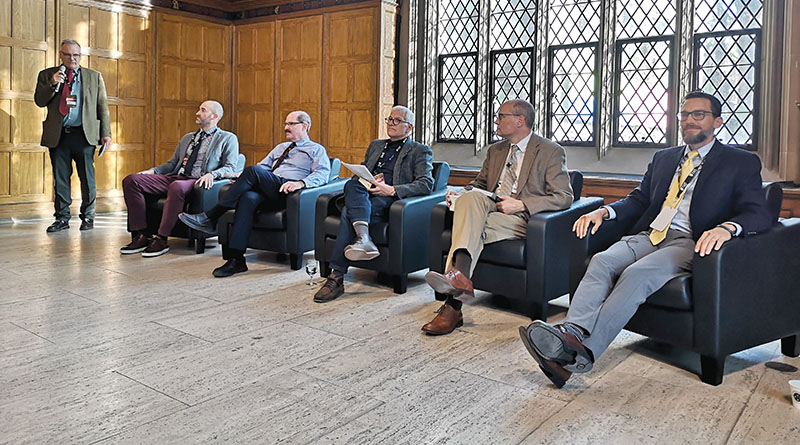An Appetizer for the Fourth Gospel
By Chris Friesen
AT THE ALL-YOU-CAN-EAT buffet that is the Bible, we each have our preferred areas, like the typical child who bypasses the soup and vegetables and heads for things battered and deep-fried. I can confess that in my own dining on Scripture, the Gospel of John has not typically been my go-to dish for personal sustenance and public ministry, apart from a few pithy declarations and favorite narratives.
Thus, the topic of Wycliffe College’s Scripture and Theology Colloquium on Oct. 21, “The Gospel of John & Its Prologue,” promised to be of particular value for maturing my biblical taste. I joined forty or so in-person participants, and fifteen online, to hear a quartet of scholarly papers on the first eighteen verses of John. Two of the presenters were from Wycliffe – professors Joseph Mangina and Stephen Chester, who are currently co-teaching a course on John. The two others had travelled some geographical and ecclesial distance – professors Michael Dauphinais of Ave Maria University in Florida and Paul Anderson of George Fox University in Oregon. All four were invited based on their research expertise in the Fourth Gospel and the New Testament.
An evangelical Anglican graduate school at the University of Toronto, Wycliffe College has been presenting its Scripture and Theology Colloquium biannually since 2008, with the fall edition devoted to a portion of biblical text and the spring edition to a theological theme. The colloquia are “close to the beating heart of what Wycliffe is all about,” says Mangina. They aim above all to practise and model collaboration between Biblical Studies and Theology, two disciplines always liable to veer apart into their own preoccupations: on the one side, the historical minutiae of particular texts and contexts, and on the other, the grand conceptualities of canon and tradition. Wycliffe maintains that authentic Christian knowledge requires both.
The colloquia’s second aim is to bring established scholars into conversation with students and younger scholars around questions of ongoing significance to the field. The presenting question on Oct. 21 was how to understand the epic opening of the Fourth Gospel. What kind of literary object is before us in these eighteen verses and how did it come into being? How should we read it in relation to the book that follows and the biblical literature that precedes it? To what details of its discourse should we pay special attention? Each presenter took up these questions in varying proportions.
Paul Anderson, author of The Fourth Gospel and the Quest for Jesus (2006), focused on the genre and origin of the Prologue. He rejected out of hand Rudolf Bultmann’s now-discredited theory that Gnostic editing is responsible for the transcendent view of Jesus displayed in places like John 1:1-3 and 8:58. “There is no stylistic, contextual or theological evidence for this inference of alien sources underlying or overlaying the Evangelist’s work,” Anderson averred. That said, he is willing to imagine a more complex authoring of this Gospel than one in which the eyewitness whom tradition calls John simply sits down and commences an account of his experiences with the phrase, “In the beginning was the Word…” Through detailed comparison with the language, structure and function of another biblical Prologue – that of the epistle of First John – Anderson expounded his thesis that the ongoing community of Christians around the author of the Fourth Gospel composed its Prologue as a confessional response to his witness to them over the years. They did so by adapting a three-stanza Christ hymn already in use for teaching and worship within their community. That theory need not be taken to undermine the Prologue’s authority or reliability, however. Anderson emphasized that its theological affirmations flow out of authentic and transformative historical experience of Jesus and are intended to lead back into the same. Through this movement, the words, “We have seen his glory,” in verse fourteen may be confessed by future disciples along with the first.
The colloquium’s second paper shifted the morning’s focus from a historical outlook to a theological one. If we conceive of that shift as one from looking at a pair of binoculars to looking through them, then presenter Joseph Mangina took up the binoculars of John and contemplated the church – not the shadowy one behind the text but the church directly evoked by the text’s message, both then and now. In this “figural ecclesial reading,” as he called it, Mangina drew on research for his upcoming book, The Temple of His Body: A Johannine Ecclesiology (slated for publication in 2023) and discussed the Johannine and wider biblical imagery of flock, vineyard and temple as they apply to the people of Christ. John’s Prologue prepares us well for this theme, he pointed out, by sketching from the very start the essential identity of the community of Jesus. They are “children…born of God,” therein constituting a family (John 1:13), those who have recognized and received the true Light shining in the darkness (John 1:5, 9-12). Even the Prologue’s pivotal fourteenth verse, “The Word became flesh and made his dwelling among us,” can be heard to bear mysteriously on the church in the sense that the incarnate Word now tabernacles in his followers, who are his body and his temple.
The colloquium’s third presenter, Michael Dauphinais, further engaged the theme of incarnation in John’s Prologue. He cited Irish social psychologist Diarmuid O’Murchu who has criticized the Fourth Gospel for its anthropocentrism (i.e. human-centeredness) and has argued that God’s incarnation takes place in cosmic creation, not exclusively in Jesus. In response to that claim, Dauphinais proposed a “non-competitive participatory reading” of incarnation in John, using the medieval philosopher-theologian Thomas Aquinas as a conversation partner. (Dauphinais has co-edited the 2010 volume, Reading John with St. Thomas Aquinas.) Rather than considering the uniqueness of Christ-incarnate to be a threat to the rest of creation and humankind, Dauphinais asserted that “Jesus’s divinity is for the sake of the world.” Christ participates in humankind so that humankind may participate in him, a relation supremely manifested in the Eucharist. For Aquinas as Johannine commentator, Dauphinais explained, the language of the “the living bread that came down from heaven” (John 6:32-33; 50-51) points first to incarnation, and only then to Communion.
The interpretive strategy of taking a giant of the tradition as one’s reading partner was repeated by the colloquium’s final presenter, Stephen Chester, who drew on twentieth-century Swiss theologian Karl Barth’s lectures on John to supplement his own study of the role of John the Baptist in the Johannine Prologue. Fifty years ago, the majority opinion in the academy was that the references to the Baptist in the Fourth Gospel, especially in its first chapter (e.g. John 1:6, 15, 30), reflected a historical situation of competition between communities and a polemical attempt to put the Baptist in his place. As an attentive New Testament scholar whose 2017 study, Reading Paul with the Reformers, won Christianity Today’s book-of-the-year award in Biblical Studies, Chester, like others before him, challenges that theory on literary-rhetorical and exegetical grounds. He directed our attention to what is actually written about John in the Prologue’s seventh verse after the Baptist’s surprising incursion into the cosmic narrative: “He came as a witness to testify to the light, so that all might believe through him.” Far from undercutting John, these words honour him most highly as the greatest human witness to Christ, Chester contended. Citing Barth, he affirmed the Baptist as both final Old Testament prophet and first New Testament apostle, “the last to bear witness to him who is to come and the first to bear witness to him who has already come.” The key takeaway here? Human witness to Jesus, the Word who is God, makes a difference.
The colloquium’s four papers were followed by a summative response from Professor Ben Reynolds of Tyndale University in Toronto and a panel discussion moderated by Professor Mark Elliott of Wycliffe College. At day’s end, full of good ideas for how to regard, employ, examine and construe the Fourth Gospel, I went home satiated but with a new desire to explore John’s text and related scholarship. The appetizing effect had been produced both by the quality of the day’s presenters and by the Prologue they had broken open and shared with us.
Returning to my notion of dining on Scripture, then, I’m left with a handful of new insights about Bible reading as a kind of eating. 1) Knowing where food comes from and how it was prepared can profoundly enrich your appreciation of it. (Thanks, Paul Anderson.) 2) Look at the plate before you begin. Presentation matters. (Thanks, Joe Mangina.) 3) One learns how to eat well – what utensils to use, what size of bites to take, what menu pairings aid pleasure and digestion – by dining together with others. (Thanks, Michael Dauphinais.) 4) Chew your food thoroughly before swallowing. (Thanks, Stephen Chester). 5) Finally, don’t be a picky eater, or you may miss out on some unrecognized delicacies. (Thank you, Wycliffe College.) TAP
Chris Friesen is a third-year PhD student in Theology at Wycliffe College. He attends Little Trinity Anglican Church in Toronto with his wife Louise and three of their children.




